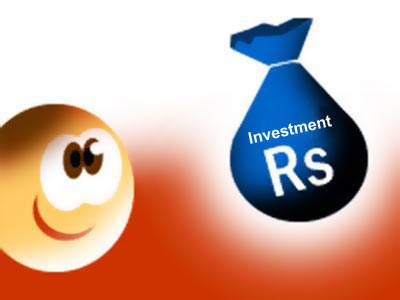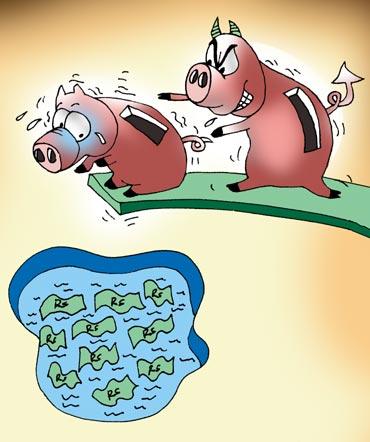Photographs: Rediff Archives Sridhar Vetapalem
There are a number of pre-requisites for us to be able to take informed investment decisions. Here are six most important ones.
1. Understanding difference between saving and investing
Saving money is more to do with your income and expenses. It is about spending less than you earn. The change in behaviour related to lifestyle choices today is leading to an attitude of buying/consuming today by paying from future earnings. This is done by taking personal loans and borrowing through credit cards. So the first step to progress towards investing is to ensure that savings are happening.
The primary objective of an investment is to generate a return on money invested. For an investor an important benchmark to keep in mind is his/her 'personal inflation rate' (PIR). The inflation rate which affects the cost of living of a person is generally higher than the figure quoted by government. It is extremely important that an investor is able to grow money at a rate that is higher than this PIR. Most fixed interest investments on a post tax basis tend to give a return that is lower than PIR (MUST READ: Equity vs fixed deposits: Why equity WINS!).
Vetapalem Sridhar is a financial planning specialist based in Pune. He can be reached at vetapalems@rediffmail.com.
Courtesy: www.finplan.in
Six ways of making GREAT investment decisions
Photographs: Rediff Archives
2. Understanding importance of asset allocation
It is by far the most important tool, which if used properly, could take care of the most important part of the strategy regarding your investing. Average long term returns are primarily dependent on the asset allocation followed. Different assets tend to give different returns over the long term, based on the risk associated with them. Hence it matters in which assets we hold our savings.
Let us take a simple example (see table) of a person who invested Rs 100 when she started working 31 years back. If Rs 100 was invested into equities as represented by the BSE Sensex (In 1979 the value of BSE Sensex was 100), it would have grown to Rs 17,000 (approximate value of BSE Sensex in June 2010). If the same Rs 100 in 1979 was invested in a bank FD, then the current value of the same would approximately be around Rs 1,450 (assuming that the returns given by the FD was 9 per cent compounded annual returns).
Bank FD rates are fixed and generally linked to inflation. Current FD (Jun 2010) rates are between 5 to 8 per cent.
Money in equities over the last 31 years would have grown by 12 times more than that invested in debt. However, this does not mean we put all money into equities. Asset allocation strategy would enable you to make decisions based on your needs and risk profile. This in turn would help you create a balance between various aspects of return, liquidity and stability.
Six ways of making GREAT investment decisions
Photographs: Rediff Archives
3. Practical understanding of various financial investment options (equity, debt, real estate, commodities, etc.):
Awareness and understanding of various investment options would enable a person to make better decisions. If someone tells us that if we do a bank FD we will get a return of 20 per cent per annum, we immediately would know that it is not true. Why is that? It is because we know how banks work and what kind of returns they offer to depositors.
Infact, a lot of people keep tabs of which bank offers higher returns on deposits.
Most investors take investment decisions based on some external influence. This maybe in the form of:
- Recommendation from your investment advisor
- What your parents or elder's suggest
- What your friend, colleague or relative has invested in
- What you have read somewhere (online, newspaper, magazine, etc)
- Advertisement on television (example: insurance ads that appeal to your emotions)
It is extremely important to be able to understand and evaluate if this external influence is giving you the correct input to take decisions. It is important that you become aware about how various investment options work. This would enable you to understand what happens to your money when you invest it and hence be able to take better decisions.
Six ways of making GREAT investment decisions
Photographs: Rediff Archives
4. Financial planning (Objective based investment strategy)
If you had money to invest and were not bothered about needing it sometime in future to fulfill your needs, investing would be so much easier. The only focus then in investing would be to earn maximum return. This can be true for someone who is sitting on a huge pool of wealth. Otherwise, most part of money owned would be consumed by a person in his or her lifetime to meet various needs and goals in life. In such a case money saved today is destined to be consumed sometime in future. Financial planning would enable a person to plan savings and invest these savings to grow at an adequate rate. This in turn would help create enough money in future to meet needs and goals in life.
Investing without a plan is like walking in the dark without a torch. A Financial plan acts like a torch and guides you in the right direction. Investment decision-making based on a financial plan is oriented towards meeting you needs and goals in life. These decisions can be evaluated at regular intervals to see if you are moving closer to your objectives in life.
Say for example you need to create Rs 20 lakh in 15 years for your child's education. You can work backwards and find out how much you need to invest each month and at what rate you need to grow this money to reach the objective of creating Rs 20 lakh. This would enable you to work out the most suitable investment strategy. This investment strategy would form the basis on which decisions are made. And as time progresses it is possible to evaluate decisions and see if you are on track. And if changes are needed then they can be made. A SIP of Rs 3,250 per month growing at 15 per cent CAGR would become Rs 20 lakh in 15 years.
Six ways of making GREAT investment decisions
Photographs: Rediff Archives
5. Understanding emotional self (What makes us take decisions we take)
To beat inflation it becomes essential to invest in options with higher risk. The options can vary from equities, real estate, commodities, etc. Let us take the example of equities. Markets tend to move in both up and down directions. Statistics have shown that majority of small investors tend to invest closer to the peak levels of markets and sell when markets are at bottom valuations. One of the primary reasons for this is emotions interfering with investment decision-making.
When markets rise and everyone talks about how much money is being made, greed kicks in and a person invests money. However it takes a while for this greed to kick in and hence in most cases investors invest at peak of the market. Similarly when a market starts to crash, the same person who invested at the peak of the market thinks that the market will recover. Over time the markets instead of recovering, falls to lower levels. Then fear sets in and the investor thinks that it is best to sell out and get whatever money is possible. Greed and fear at some point of time influence decision-making. In certain instances it becomes the primary reason for taking investment decisions.
It is very important that decision making regarding investing is on a rational basis rather than driven by emotions. There has to be a sound and strong logic for an investment decision being made, and neither greed nor fear is one of them.
Six ways of making GREAT investment decisions
Photographs: Rediff Archives
6. Knowing the seller's viewpoint (Someone who is selling us an investment product)
Other than banks there are very few investment professionals who have all investment products on offer. Those that do not have all investment products on offer, concentrate only on specific product groups (mutual funds, shares, insurance, post/deposits/bonds, etc).
Let us take an example of someone dealing only in shares. When this person comes to sell you a product, it is going to be related only to shares. Even if your requirement is to invest in a safe place where lower returns are acceptable, the seller is going to convince you that you need to open a broking account and do trading. Even if the seller understands your need, he/she will not suggest to you or offer you the safe investment option. In a competitive world we are continuously hit by such people.
Even those investment professionals who have all investment products on offer generally work with some kind of sales target for specific product groups. This is especially true about insurance based products where sales targets are higher and margins are better in selling that product group.
So a seller will always think in terms of profitability and margins when suggesting to you a product rather than suggesting to you a product primarily based on your needs.
So it is really important to understand how the seller earns money when a product is sold to you. This would enable you to identify conflict of interest and hence put you in a position where you are able to take better decisions regarding investing.







Comment
article